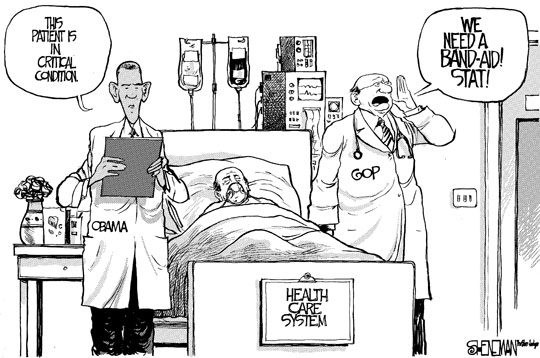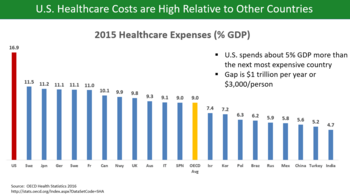How Much Does Health Care Cost Can Be Fun For Anyone
This is based on danger pooling. The social medical insurance model is also referred to as the Bismarck Model, after Chancellor Otto von Bismarck, who presented the first universal health care system in Germany in the 19th century. The funds generally contract with a mix of public and private companies for the provision of a specified advantage plan.
Within social health insurance coverage, a number of functions may be performed by parastatal or non-governmental illness funds, or in a few cases, by private medical insurance companies. Social health insurance coverage is used in a variety of Western European countries and significantly in Eastern Europe along with in Israel and Japan.

Personal insurance coverage consists of policies sold by industrial for-profit firms, non-profit companies and community health insurance companies. Normally, personal insurance is voluntary in contrast to social insurance coverage programs, which tend to be compulsory. In some nations with universal protection, personal insurance typically omits certain health conditions that are pricey and the state health care system can supply protection.
In the United States, dialysis treatment for end phase renal failure is usually paid for by federal government and not by the insurance coverage market. Those with privatized Medicare (Medicare Advantage) are the exception and should get their dialysis paid for through their insurer. Nevertheless, those with end-stage kidney failure usually can not buy Medicare Advantage plans - how much is health care.
The Preparation Commission of India has also recommended that the nation must welcome insurance to accomplish universal health protection. General tax profits is currently used to satisfy the essential health requirements of all individuals. A particular type of personal medical insurance that has actually frequently emerged, if financial threat security mechanisms have only a minimal effect, is community-based medical insurance.
Contributions are not risk-related and there is generally a high level of community involvement in the running of these plans. Universal healthcare systems vary according to the degree of federal government participation in supplying care or health insurance. In some nations, such as Canada, the UK, Spain, Italy, Australia, and the Nordic nations, the government has a high degree of participation in the commissioning or shipment of healthcare services and access is based upon home rights, not on the purchase of insurance coverage.
In some cases, the health funds are obtained from a mix of insurance coverage premiums, salary-related mandatory contributions by workers or employers to controlled sickness funds, and by federal government taxes. These insurance coverage based systems tend to compensate private or public medical suppliers, frequently at greatly managed rates, through shared or openly owned medical insurance companies.
How How To Take Care Of Mental Health can Save You Time, Stress, and Money.

Universal health care is a broad concept that has actually been carried out in numerous ways. The common denominator for all such programs is some type of government action targeted at extending access to health care as extensively as possible and setting minimum standards. The majority of carry out universal healthcare through legislation, guideline, and taxation.
Usually, some costs are borne by the client at the time of intake, however the bulk of expenses originated from a mix of compulsory insurance coverage and tax earnings. Some programs are paid for totally out of tax profits. In others, tax incomes are utilized either to fund insurance for the very poor or for those requiring long-term chronic care.
This is a method of arranging the delivery, and assigning resources, of health care (and potentially social care) based on populations in a provided location with a typical need (such as asthma, end of life, immediate care). Rather than concentrate on organizations such as hospitals, main care, community care etc. the system concentrates on the population with a common as a whole.
where there is health inequity). This method motivates integrated care and a more reliable usage of resources. The United Kingdom National Audit Workplace in 2003 released an international contrast of 10 various health care systems in ten established countries, 9 universal systems versus one non-universal system (the United States), and their relative expenses and essential health results.
Sometimes, federal government involvement likewise includes directly managing the healthcare system, however many countries use blended public-private systems to provide universal healthcare. World Health Organization (November 22, 2010). Geneva: World Health Organization. ISBN 978-92-4-156402-1. Recovered April 11, 2012. " Universal health coverage (UHC)". Obtained November 30, 2016. Matheson, Don * (January 1, 2015).
International Journal of Health Policy and Management. 4 (1 ): 4951. doi:10.15171/ ijhpm. 2015.09. PMC. PMID 25584354. Abiiro, Gilbert Abotisem; De Allegri, Manuela (July 4, 2015). " Universal health coverage from multiple perspectives: a synthesis of conceptual literature and global disputes". BMC International Health and Person Rights. 15: 17. doi:10.1186/ s12914-015-0056-9. ISSN 1472-698X.
PMID 26141806. " Universal health protection (UHC)". World Health Organization. December 12, 2016. Retrieved September 14, 2017. Rowland, Diane; Telyukov, Alexandre V. (Fall 1991). " Soviet Healthcare From Two Viewpoints" (PDF). Health Affairs. 10 (3 ): 7186. doi:10.1377/ hlthaff. 10.3.71. PMID 1748393. http://emiliohfrf201.trexgame.net/what-does-a-health-care-professional-is-caring-for-a-patient-who-is-taking-zolpidem-do "OECD Reviews of Health Systems OECD Evaluations of Health Systems: Russian Federation 2012": 38.
Getting The Who Health Care Rankings To Work
" Social well-being; Social security; Benefits in kind; National health schemes". The new Encyclopdia Britannica (15th ed.). Chicago: Encyclopdia Britannica. ISBN 978-0-85229-443-7. Recovered September 30, 2013. Richards, Raymond (1993 ). " Two Social Security Acts". Closing the door to destitution: the shaping of the Social Security Acts of the United States and New Zealand.
p. 14. ISBN 978-0-271-02665-7. Recovered March 11, 2013. Mein Smith, Philippa (2012 ). " Making New Zealand 19301949". A concise history of New Zealand (2nd ed.). Cambridge: Cambridge University Press. pp. 16465. ISBN 978-1-107-40217-1. Obtained March 11, 2013. Serner, Uncas (1980 ). "Swedish health legislation: milestones in reorganisation since 1945". In Heidenheimer, Arnold J.; Elvander, Nils; Hultn, Charly (eds.).
New York: St. Martin's Press. p. 103. ISBN 978-0-312-71627-1. Universal and detailed health insurance was discussed at intervals all through the Second World War, and in 1946 such an expense was voted in Parliament. For financial and other reasons, its promulgation was postponed until 1955, at which time coverage was encompassed include drugs and illness settlement, as well.
( September 1, 2004). " The developmental well-being state in Scandinavia: lessons to the developing world". Geneva: United Nations Research Study Institute for Social Development. p. 7. Recovered March 11, 2013. Evang, Karl (1970 ). Health services in Norway. English version by Dorothy Burton Skrdal (3rd ed.). Oslo: Norwegian Joint Committee on International Social Policy.
23. OCLC 141033. Because 2 July 1956 the whole population of Norway has actually been included under the required health nationwide insurance program. Gannik, Dorte; Holst, Erik; Wagner, Mardsen (1976 ). "Main healthcare". The nationwide health system in Denmark. Bethesda: National Institutes of Health. pp. 4344. hdl:2027/ pur1.32754081249264. Alestalo, Matti; Uusitalo, Hannu (1987 ).
In Flora, Peter (ed.). Development to limits: the Western European well-being states since World War II, Vol. 4 Appendix (run-throughs, bibliographies, tables). Berlin: Walter de Gruyter. pp. 13740. ISBN 978-3-11-011133-0. Recovered March 11, 2013. Taylor, Malcolm G. (1990 ). "Saskatchewan healthcare insurance coverage". Insuring national health care: the Canadian experience. Chapel Hill: University of North Carolina Press.
96130. ISBN 978-0-8078-1934-0. Maioni, Antonia (1998 ). " The 1960s: the political fight". Parting at the crossroads: the emergence of health insurance in the United States and Canada. Princeton: Princeton University Press. pp. 12122. ISBN 978-0-691-05796-5. Obtained September 30, 2013. Kaser, Michael (1976 ). "The USSR". Health care in the Soviet Union and Eastern Europe.
